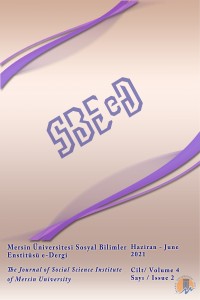Öz
İbni Haldun’un analizinde Orta Doğu toplumsal formasyonları Doğu Despotizmi, patrimonyal-bürokratik yönetim veya Asya Üretim Tarzı olarak karakterize edilebilecek birer tarımsal haraççı devletlerdir. Bu devletlerde artığa devlet tarafından el konulması sürecinin açıklanmasında ideolojik bir işleve sahip adalet dairesi önemli bir kavramsal çerçeve oluşturmaktadır. Bu çalışmada İbni Haldun’un bir devletin çökmesine ilişkin açıklamalarının esas olarak adalet dairesi bağlamında üretim ilişkileri yoluyla açıklanabileceği ortaya konulmuştur. İbni Haldun’un adalete ilişkin açıklamaları, kapitalizm öncesi yapılardaki üretim ilişkilerinin geleneksel ilişkilerde gömülenmesi çerçevesinde değerlendirilmiştir. Buna göre artığa devlet tarafından el konulması ve sonrasında artığın iktidardakilerin kendi aralarında yeniden dağıtılması adalet dairesi yoluyla meşru gösterilmiştir. Başka bir deyişle adalet dairesi yoluyla üretim ilişkilerinin manipüle edildiği ortaya çıkmıştır.
Anahtar Kelimeler
Kaynakça
- Darling, L. T. (2002). ‘Do Justice, Do Justice, For That is Paradise’: Middle Eastern Advice for Indian Muslim Rulers. Comparative Studies of South Asia, Africa and the Middle East, 22 (1-2) 3–19.
- Haldon, J. (1993). The State and The Tributary Mode of Production. Verso: London & New York.
- Haldun, İ. (2014a). Mukaddime, I (2. bs., S. Belli, Çev.). Ankara: Onur Yayınları.
- Haldun, İ. (2014b). Mukaddime, II (2. bs., S. Belli, Çev.). Ankara: Onur Yayınları.
- İnalcık, H. (1964). The Nature of Traditional Society. R. Ward ve D. Rustow (Eds), Political Modernization in Japan and Turkey içinde. Princeton: Princeton University Press.
- Keyder, Ç. (1989). Türkiye’de Devlet ve Sınıflar (S. Tekay, Çev.). İstanbul: İletişim Yayıncılık.
- Öz, M. (1999). Klasik Dönem Osmanlı Siyasi Düşüncesi: Tarihi Temeller ve Ana İlkeler. İslami Araştırmalar Dergisi, 1 (12): 27-33.
- Salgar, E. (2015). İlerleme Kavramı ve Bilimdeki Yansımaları: ‘Prokope’, ‘Profectus’ ve ‘Progressus’a Evrilen Sürecin Öyküsü. İstanbul: Hiperlink Yayınları.
- Şenel, A. (1982). İlkel Topluluktan Uygar Topluma Geçiş Aşamasında Ekonomik Toplumsal Düşünsel Yapıların Etkileşimi. Ankara: Ankara Üniversitesi Siyasal Bilgiler Fakültesi Yayınları.
ANALYSIS OF THE STATE’S COLLAPSE ACCORDING TO IBNI KHALDUN: AN EVALUATION IN THE CONTEXT OF THE JUSTICE CIRCLE
Öz
In Ibn Khaldun's analysis, Middle Eastern social formations are agricultural tributer states that can be characterized as Eastern despotism, patrimonial-bureaucratic administration, or Asiatic mode of production. In these states, the justice circle, which has an ideological function in explaining the process of confiscation of the surplus by the state, forms an important conceptual framework. In this study, it was revealed that Ibn Khaldun's explanations of the collapse of a state could be explained mainly through relations of production in the context of the justice circle. Ibn Khaldun's statements about justice were evaluated within the framework of embedding the relations of production in pre-capitalism structures in traditional relations. Accordingly, the confiscation of the surplus by the state and subsequent redistribution of the surplus among those in power has been made legitimate by the justice circle. In other words, it was revealed that production relations were manipulated through the justice circle.
Anahtar Kelimeler
Kaynakça
- Darling, L. T. (2002). ‘Do Justice, Do Justice, For That is Paradise’: Middle Eastern Advice for Indian Muslim Rulers. Comparative Studies of South Asia, Africa and the Middle East, 22 (1-2) 3–19.
- Haldon, J. (1993). The State and The Tributary Mode of Production. Verso: London & New York.
- Haldun, İ. (2014a). Mukaddime, I (2. bs., S. Belli, Çev.). Ankara: Onur Yayınları.
- Haldun, İ. (2014b). Mukaddime, II (2. bs., S. Belli, Çev.). Ankara: Onur Yayınları.
- İnalcık, H. (1964). The Nature of Traditional Society. R. Ward ve D. Rustow (Eds), Political Modernization in Japan and Turkey içinde. Princeton: Princeton University Press.
- Keyder, Ç. (1989). Türkiye’de Devlet ve Sınıflar (S. Tekay, Çev.). İstanbul: İletişim Yayıncılık.
- Öz, M. (1999). Klasik Dönem Osmanlı Siyasi Düşüncesi: Tarihi Temeller ve Ana İlkeler. İslami Araştırmalar Dergisi, 1 (12): 27-33.
- Salgar, E. (2015). İlerleme Kavramı ve Bilimdeki Yansımaları: ‘Prokope’, ‘Profectus’ ve ‘Progressus’a Evrilen Sürecin Öyküsü. İstanbul: Hiperlink Yayınları.
- Şenel, A. (1982). İlkel Topluluktan Uygar Topluma Geçiş Aşamasında Ekonomik Toplumsal Düşünsel Yapıların Etkileşimi. Ankara: Ankara Üniversitesi Siyasal Bilgiler Fakültesi Yayınları.
Ayrıntılar
| Birincil Dil | Türkçe |
|---|---|
| Bölüm | Makaleler |
| Yazarlar | |
| Yayımlanma Tarihi | 30 Haziran 2021 |
| Gönderilme Tarihi | 25 Mart 2021 |
| Yayımlandığı Sayı | Yıl 2021 Cilt: 4 Sayı: 2 |


